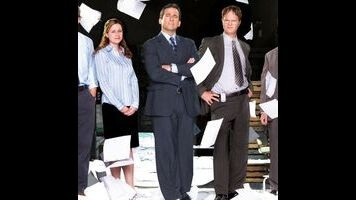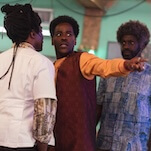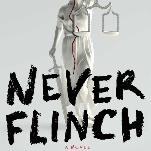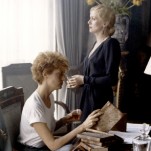At its lowest lows, when the lack of focus that followed Steve Carell’s departure made itself most apparent, The Office always had the core trio of Jim, Pam, and Dwight. It didn’t always use that core to its fullest potential or its most natural narrative ends, but it’s been there since day one. And for long-time viewers of The Office frustrated by seasons eight and nine, the occasional glimpse of the triangle that elevated an episode like “The Injury” could be seen in an episode like “Work Bus,” where the story is grounded in the unlikely friendship forged between three people wouldn’t have anything to do with one another were it not for four walls in Scranton, Pennsylvania.
What benefits “A.A.R.M.” most—and has benefited the brightest corners of this final season—is a back-to-basics Jim-and-Dwight storyline. Installing Jim as assistant to the regional manager in “Livin’ The Dream” may have been a power play on Dwight’s part, but his hubris has ensured his own downfall: Jim spends the majority of “A.A.R.M.” playfully undermining Dwight, as if Pam is still at reception and not within arms reach of her husband. But Jim is no longer the apartment-renting, Clap Your Hands Say Yeah-blasting bachelor he was during the show’s second season. His roommates are a wife and two children now, so he can’t very well spend all of his time goofing off. Pam loves Goofy Jim, but as poignantly expressed in her contribution to the A-plot, she’s unsure if she can watch her husband divert his potential and ambition into another nine years of fucking around on the job. “No-nonsense” is the new nonsense at Dunder Mifflin—the type of circular, closed-loop logic that drives much of “A.A.R.M.”—and it’s killing Pam.
But, man, is it ever fun to watch John Krasinski undermine Rainn Wilson one more time. The assistant to the assistant to the regional manager competition is vintage Office, right down to the obstacle course composed of stuff lying around the warehouse. It’s been a while since this type of story ceased being The Office’s bread and butter, but the source of its laughs remains the same. As much as the Jim-Dwight relationship has evolved—from sincere rivalry to grudging tolerance to something approaching brotherhood—there’s always been a fundamental difference between the characters that fuels the comedy in John Krasinski bumping up against Rainn Wilson (and vice versa). They’re two sides of an aged-up Goofus-and-Gallant strip, where Goofus can actually get things done and Gallant’s fastidiousness verges on fascism. Dwight takes every aspect of his life so seriously that Jim can’t help but see how far he can push that tendency. On the surface, there isn’t much difference between “Office Olympics” and “A.A.R.M.”—we see the growth after Dwight makes himself the assistant to his assistant.
The full-circle vibe in Jim and Dwight’s section of “A.A.R.M.” becomes apparent when the former recognizes the latter’s “summoning bag” as an SOS. The conversation they have in Dwight’s office is a prime example of the softening of a TV show’s edge that comes with a rivalry’s evolution into friendship. No matter how sharp the showrunner, no matter how inventive the writing staff, eventually every TV show is going to exhaust the well of storylines like “Jim pulls a prank on Dwight.” The Office underwent a noticeable shift in tone when that particular reserve went dry—ironically, it got much louder, with a lack of opportunities for Jim to keep his sparring partner in check allowing for big, broad Schrute jokes like the checkpoint gag that opens “A.A.R.M.” One of the things that’s most striking about the episode’s A-plot is how patient it is in revealing Jim’s full plot. There’s still a talking head that drives the point home, but there’s also a giddy surge to watching the pieces of Jim’s plot fall into place.
There’s some loudness, and it’s ultimately toothless, but this is where The Office is one episode from its conclusion. The show has survived this long by plowing through the damned if you do, damned if you don’t pitfalls of a long-running series. It’s a shadow of its former self, but it’s still here. And I’d be saying the same thing if the writers used seasons four through nine as a weekly space for the latest Halpert practical joke. The series was never going to match the comedic potency of its first three years, so it shifted priorities; time and diminishing returns necessitated the dilution of the interactions between what was once network TV’s sharpest comedic duo. The Dwight and Jim we see in the second-tenderest moment of “A.A.R.M.” were necessary for the show’s survival. Should it have survived this long? No. But it kept a lot of talented people employed for two more years; there’s a testament to those who came before them or previously served alongside them in Dwight barking “Get the hell out of my office” at Jim.
Pam’s sudden realization that Jim is backsliding makes for the third-most tender moment of “A.A.R.M.,” but it’s the climax of the Halperts’ season-nine soap opera that takes the emotional cake in this hour-long episode. It’s a bit of a cheat, but the montage Jim commissions from The Documentarians—hey, if they’re going to be characters, they might as well lend the guy a hand—gave me the chills the coda of “Paper Airplane” didn’t. And then to throw the note from “Christmas Party” on top of it? If there’s any portion of “A.A.R.M.” that uses the episodes additional time wisely, it’s this storyline, a payoff that feints toward sudden reversal but underlines Jim’s statement to Dwight: When it comes to love, “you’ve got to forget about logic and fear and doubt.” There was a while when Jim and Pam’s romance was the reason to watch The Office—before that narrative’s natural conclusion arrived and staleness crept in. “A.A.R.M.” takes the easy route with its greatest-hits package, but it’s an effective reminder to the characters and the viewers.
The Office has always been an ensemble show with a strong core and a big heart (even before its comedic sensibilities started to soften). The size of that heart is ultimately defined by the fact that, with only two hours of airtime remaining, the show still can’t leave a single office worker alone for a week. That could be troublesome when there was nothing clicking between Jim and Dwight, or Jim and Dwight, or Dwight of Pam (or, throwback, Michael and Dwight), but with “A.A.R.M.,” it’s just harmless filler. These characters must be serviced, dammit, and with 45 minutes of playtime this week, serviced they are by Daryl’s triumphant dance out the front door of Dunder Mifflin. The show felt increasingly destabilized in its later years, but it’s still impressive how well it endowed even the most inconsequential players with at least a single character trait that could serve any given storyline. And so Meredith gets to be crass, Creed lands a few solid CreedThoughts, and Stanley takes a nap—all in ways that make sense for “A.A.R.M.” (Meredith says she would’ve toned her act down without the cameras around; Dwight’s steam-trap door is saving Creed’s laundry budget; Stanley can’t sleep with Angela’s crying baby around.) These are some of the final iterations on gags that were never strong enough to carry a full storyline, but could share some of the heavy lifting when the core players had nothing going on.
One of the earliest experiments in fleshing out the supporting cast was the season-two web series The Accountants, echoed here in the metaphorical family drama starring Angela, Oscar, and Kevin. The joke—when baby Philip spends the day in the office, the attention he requires turns Kevin into a petulant older child—declares itself early and gets hit hard, but it’s a tidy commentary on change within an episode that’s largely about stasis. Even as the characters passed major life milestones, The Office has been largely a series about running in place, and while these last few episodes demonstrate that the employees of Dunder Mifflin have been in the right place this whole time, it’s nice of the series to acknowledge the changes that arise naturally—and not the kind that develop in a fit of pique from a Cornell-educated cipher.
It’s that blend of new beginnings and closing circles that makes “A.A.R.M.” an effective second-to-last chapter of The Office, even if some of its biggest developments—Jim lets Pam know that she is enough for him; Dwight admits his love has always belonged to Angela—are too convenient or clearly telegraphed. It all comes back to what remains of the show’s original core, even the final words of the episode: The first words of the documentary, spoken by Michael Scott to Jim Halpert, which are also the first words of The Office. Jim no longer needs help closing. He’s done it. The hard part now is saying that final goodbye—and making it stick.
Stray observations:
- In Andy’s D-plot, the show runs up against reality TV in a way it’s typically eschewed. The Office and its predecessor have always been closely linked to the rise of reality programming. However, I think the faux-American Idol a cappella show hosted by Mark McGrath is the first time it’s actively tried to mimic an established franchise from the unscripted realm. I for one am glad the show held off trying to do so.
- Moving on dot org: That is, of course, part-time Marshalls spokeswoman and full-time hilarious actress Jessica St. Clair womping it up as Andy’s audition-line buddy.
- A telling glimpse of Dwight’s Dunder Mifflin: A propaganda-style portrait glaring from the conference-room wall.
- Dwight’s security doors were taken from a shuttered jewelry store: “Now they’re protecting America’s real treasure: paper.”
- Kevin broke a major appliance in a majorly Kevin way: “Some of us whose televisions who got broken during an all-you-can-eat shrimp-festival commercial are watching the documentary at Poor Richard’s.”
- Jim’s reading Dwight’s mind while Dwight’s reading Jim’s mind: “What’s the opposite of a horse?” “Seahorse.”
- One final quote, from the prelude to Dwight’s proposal, spoken through a megaphone: “THIS EXPRESSES HOW LOUDLY I LOVE YOU.” (This might be the best Dwight episode in years.)








































